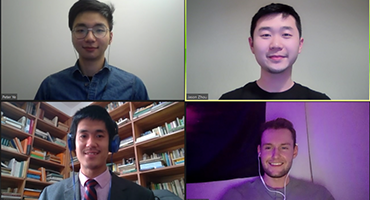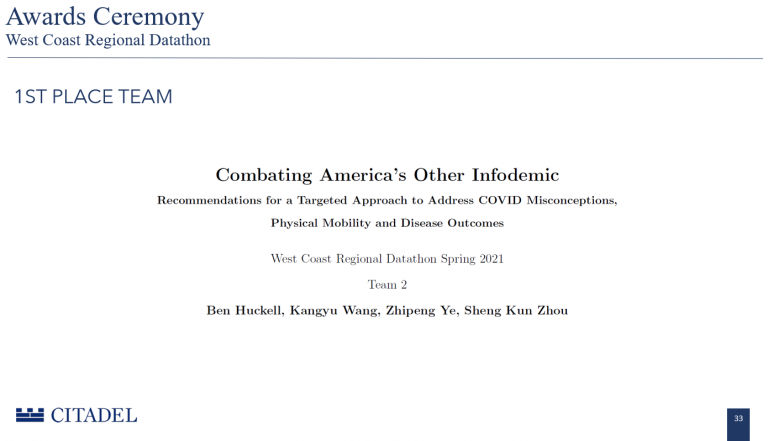First place finish for Engineering Physics students in Citadel West Coast datathon

Congratulations to UBC Engineering Physics students Ben Huckell and Jason Zhou, as well as team members UBC MSc student Mark Wang and USC MBA student Pete Ye, for a first place finish at the Citadel West Coast Regional Data Open!
Twenty-six teams of 4 were chosen from over 1,000 applicants, many of whom are graduate students from top universities such as Caltech and Stanford. During the weeklong event from February 16th to 22nd, the team was tasked with leveraging a variety of datasets describing COVID-19 impacts, responses, and outcomes around the globe to find hidden trends that could be useful to help fight the disease. The team's winning submission identified vulnerable groups susceptible to misinformation and misconceptions; the team was able to provide insights and recommendations on how misinformation is driving COVID transmission, as well as how and what authorities can focus resources on to combat this.
Below, Ben and Jason shared their experience participating in the competition. Congratulations again team!
The Citadel West Coast Regional Data Open is one of western North America’s most renowned data science focused competitions. Hosted by one of the world’s largest hedge funds, the weeklong competition challenges participating teams to find hidden trends and present insights when given large and complex datasets.
Last week, our team of 4 was fortunate enough to compete among the 100 people selected for this event, out of the 1000+ who applied. Against a field filled, to a large degree, with graduate level students from top universities such as Stanford and Caltech, we were happy and humbled to have been able to win the entire event!
For this datathon, we were given the challenging and intriguing topic of finding trends in the transmission of COVID-19. Inspired by the ongoing events and emerging trends over the past year, our team decided to tackle the complex topic of quantifying pandemic related misinformation and misconceptions in the USA, and the effects of such phenomena.
Mindful that “correlation is not causation”, our team focused on finding causal links in our diverse data on COVID statistics, mobility, misinformation, and socioeconomic/material conditions. We wanted to prove that not only these points were related, but describe the causal relationships at play in complex social systems and can be accurately portrayed and predicted using mathematical models.
In the end, our exploration identified vulnerable groups due to susceptibility to misinformation, as well as quantified the vulnerabilities of different demographics towards different types of misinformation. Based on this, we were able to give insights and recommendations on the state level on how misinformation is driving COVID transmission, as well as how and what authorities can focus resources on to combat this.
During this week of strenuous data analysis, visualization and presentation, we found that both the mathematical foundation and the presentation/documentation skills we’ve built up in the ENPH program gave us a noticeable edge. We’re incredibly proud of how our team performed, and thankful for the time, commitment and effort that each of us put into this competition. Achieving this result amongst all the talented teams truly took a dedicated team effort and the best out of all of us.
The best thing is, the journey for our team is not done! Winning the event meant an invite to the global data open finals later this year, where we cannot wait to compete against the top teams from around the world who won their respective regions.
A version of this story originally appeared on the UBC Engineering Physics Program website.
